外研版2020年中考英语语法专练(八):连词(II )卷
- 格式:doc
- 大小:126.01 KB
- 文档页数:10
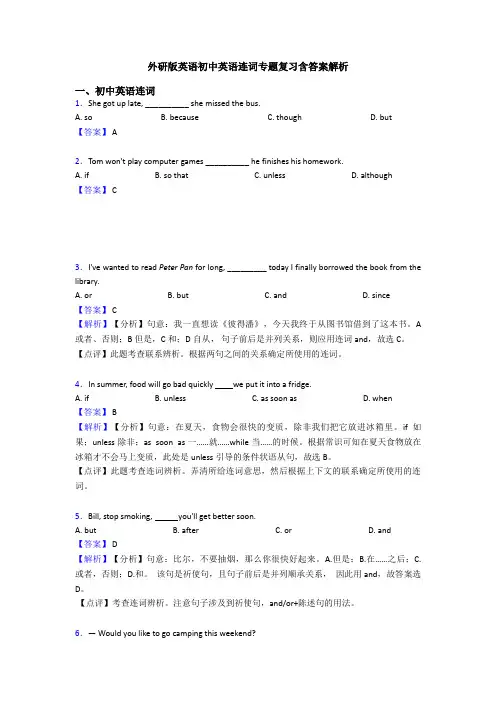
外研版英语初中英语连词专题复习含答案解析一、初中英语连词1.She got up late, __________ she missed the bus.A. soB. becauseC. thoughD. but【答案】 A2.Tom won't play computer games __________ he finishes his homework.A. ifB. so thatC. unlessD. although【答案】 C3.I've wanted to read Peter Pan for long, _________ today I finally borrowed the book from the library.A. orB. butC. andD. since【答案】 C【解析】【分析】句意:我一直想读《彼得潘》,今天我终于从图书馆借到了这本书。
A 或者、否则;B但是,C和;D自从,句子前后是并列关系,则应用连词and,故选C。
【点评】此题考查联系辨析。
根据两句之间的关系确定所使用的连词。
4.In summer, food will go bad quickly we put it into a fridge.A. ifB. unlessC. as soon asD. when【答案】 B【解析】【分析】句意:在夏天,食物会很快的变质,除非我们把它放进冰箱里。
if 如果;unless除非;as soon as一……就……while当……的时候。
根据常识可知在夏天食物放在冰箱才不会马上变质,此处是unless引导的条件状语从句,故选B。
【点评】此题考查连词辨析。
弄清所给连词意思,然后根据上下文的联系确定所使用的连词。
5.Bill, stop smoking, you'll get better soon.A. butB. afterC. orD. and【答案】 D【解析】【分析】句意:比尔,不要抽烟,那么你很快好起来。
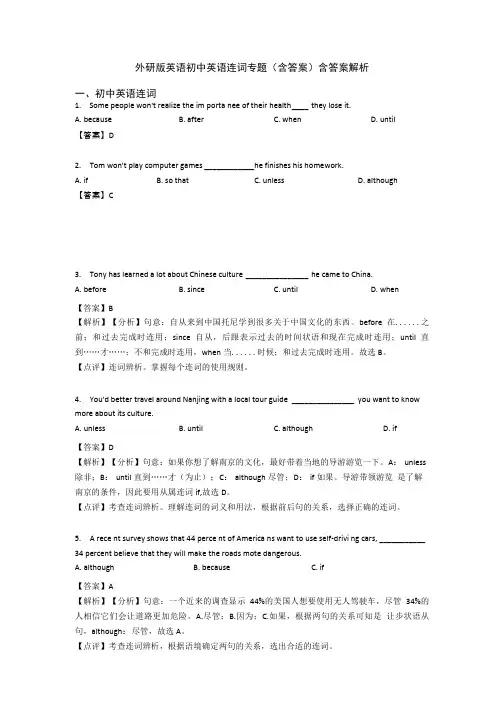
外研版英语初中英语连词专题(含答案)含答案解析一、初中英语连词1.Some people won't realize the im porta nee of their health ____ they lose it.A. becauseB. afterC. whenD. until【答案】D2.Tom won't play computer games ____________he finishes his homework.A. ifB. so thatC. unlessD. although【答案】C3.Tony has learned a lot about Chinese culture _______________ he came to China.A. beforeB. sinceC. untilD. when【答案】B【解析】【分析】句意:自从来到中国托尼学到很多关于中国文化的东西。
before在......之前;和过去完成时连用;since自从,后跟表示过去的时间状语和现在完成时连用;until直到……才……;不和完成时连用,when当......时候;和过去完成时连用。
故选B。
【点评】连词辨析。
掌握每个连词的使用规则。
4.You'd better travel around Nanjing with a local tour guide _______________ you want to know more about its culture.A. unlessB. untilC. althoughD. if【答案】D【解析】【分析】句意:如果你想了解南京的文化,最好带着当地的导游游览一下。
A: unless 除非;B: until直到……才(为止);C: although尽管;D: if如果。
导游带领游览是了解南京的条件,因此要用从属连词if,故选D。
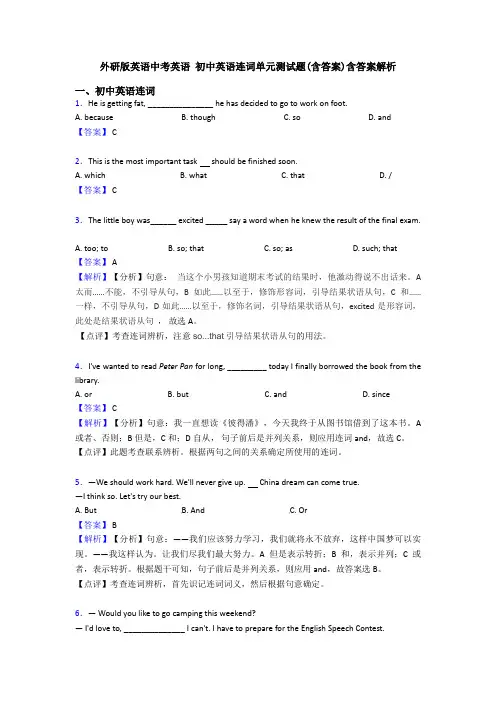
外研版英语中考英语初中英语连词单元测试题(含答案)含答案解析一、初中英语连词1.He is getting fat, _______________ he has decided to go to work on foot.A. becauseB. thoughC. soD. and【答案】 C2.This is the most important task should be finished soon.A. whichB. whatC. thatD. /【答案】 C3.The little boy was______ excited _____ say a word when he knew the result of the final exam.A. too; toB. so; thatC. so; asD. such; that【答案】 A【解析】【分析】句意:当这个小男孩知道期末考试的结果时,他激动得说不出话来。
A 太而……不能,不引导从句,B如此……以至于,修饰形容词,引导结果状语从句,C和……一样,不引导从句,D如此……以至于,修饰名词,引导结果状语从句,excited是形容词,此处是结果状语从句,故选A。
【点评】考查连词辨析,注意so...that引导结果状语从句的用法。
4.I've wanted to read Peter Pan for long, _________ today I finally borrowed the book from the library.A. orB. butC. andD. since【答案】 C【解析】【分析】句意:我一直想读《彼得潘》,今天我终于从图书馆借到了这本书。
A 或者、否则;B但是,C和;D自从,句子前后是并列关系,则应用连词and,故选C。
【点评】此题考查联系辨析。
根据两句之间的关系确定所使用的连词。
5.—We should work hard. We'll never give up. China dream can come true.—I think so. Let's try our best.A. ButB. AndC. Or【答案】 B【解析】【分析】句意:——我们应该努力学习,我们就将永不放弃,这样中国梦可以实现。
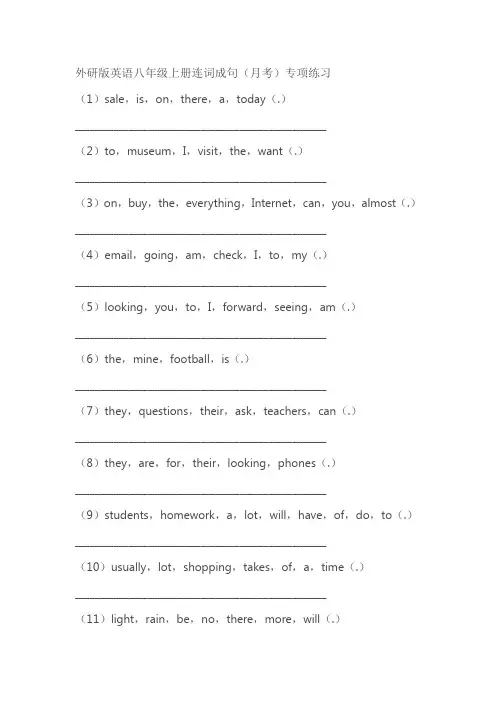
外研版英语八年级上册连词成句(月考)专项练习(1)sale,is,on,there,a,today(.)____________________________________________________(2)to,museum,I,visit,the,want(.)____________________________________________________(3)on,buy,the,everything,Internet,can,you,almost(.)____________________________________________________(4)email,going,am,check,I,to,my(.)____________________________________________________(5)looking,you,to,I,forward,seeing,am(.)____________________________________________________(6)the,mine,football,is(.)____________________________________________________(7)they,questions,their,ask,teachers,can(.)____________________________________________________(8)they,are,for,their,looking,phones(.)____________________________________________________(9)students,homework,a,lot,will,have,of,do,to(.)____________________________________________________(10)usually,lot,shopping,takes,of,a,time(.)____________________________________________________(11)light,rain,be,no,there,more,will(.)(12)won’t,years,there,be,schools,any,20,in(.)____________________________________________________(13)on,is,sale,there,a,today(.)____________________________________________________(14)our,make,beautiful,can,classroom,we(.)____________________________________________________(15)monitor,I,PE,to,be,want,the(.)____________________________________________________(16)some,are,gloves,purple,here(.)____________________________________________________(17)to,would,I,buy,mum,a,like,T-shirt,for,my(.)____________________________________________________(18)players,the,cheer,going,we,are,to(.)____________________________________________________(19)of,here,every,come,day,people,hundreds(.)____________________________________________________(20)the,will,street,see,go,along,you,station,and(.)____________________________________________________(21)join,would,I,Club,the,Music,to,like(.)____________________________________________________(22)are,litter,we,in,collect,park,to,going,the(.)(23)we,can,Chines,teach,you(e)____________________________________________________(24)can,I,piano,play,the,well(.)____________________________________________________(25)day,clear,of,see,can,on,you,most,London,a(.)____________________________________________________(26)is,price,half,everything(.)____________________________________________________(27)plane,family,a,will,every,small,have(.)____________________________________________________(28)the,is,Eye,on,right,London,your(.)____________________________________________________(29)born,a,small,I,in,was,village(.)____________________________________________________(30)way,to,see,best,London,the,by,boat,is(.)____________________________________________________(31)to,a,be,is,going,it,weekend,fantastic(.)____________________________________________________(32)with,lake,there,was,fish,a,it,in(.)____________________________________________________外研版英语八年级上册连词成句(月考)专项练习(参考答案)1.There is a sale on today.2.I want to visit the museum.3.You can buy almost everything on the Internet.4.I am going to check my email.5.I am looking forward to seeing you.6.The football is mine.7.They can ask their teachers questions.8.They are looking for their phones.9.Students will have a lot of homework to do.10.Shopping usually takes a lot of time.11.There will be no more light rain.12.There won’t be any schools in 20 years.13.Today there is a sale on.14.We can make our classroom beautiful.15.I want to be the PE monitor.16.Here are some purple gloves.17.I would like to buy a T-shirt for my mum.18.We are going to cheer the players.19.Hundreds of people come here every day.20.Go along the street and you will see station.21.I would like to join the Music Club.22.We are going to collect litter in the park.23.We can teach you Chinese.24.I can play the piano well.25.You can see most of London on a clear day.26.Everything is half price.27.Every family will have a small plane.28.The London Eye is on your right.29.I was born in a small village.30.The best way to see London is by boat.31.It is going to be a fantastic weekend.32.There was a lake with fish in it.。
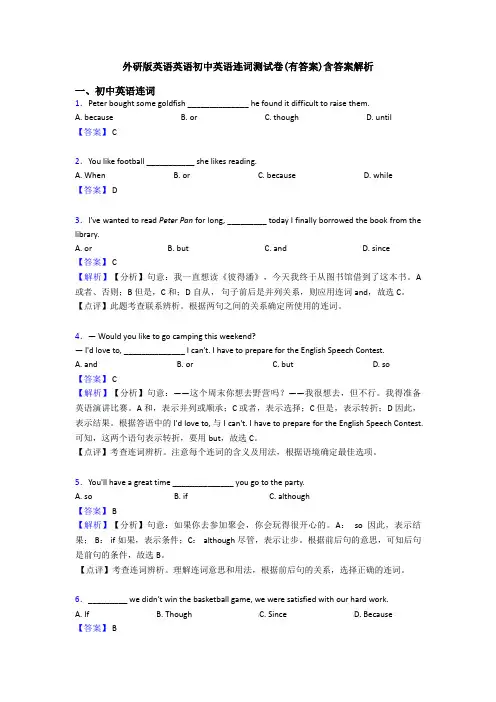
外研版英语英语初中英语连词测试卷(有答案)含答案解析一、初中英语连词1.Peter bought some goldfish ______________ he found it difficult to raise them.A. becauseB. orC. thoughD. until【答案】 C2.You like football ___________ she likes reading.A. WhenB. orC. becauseD. while【答案】 D3.I've wanted to read Peter Pan for long, _________ today I finally borrowed the book from the library.A. orB. butC. andD. since【答案】 C【解析】【分析】句意:我一直想读《彼得潘》,今天我终于从图书馆借到了这本书。
A 或者、否则;B但是,C和;D自从,句子前后是并列关系,则应用连词and,故选C。
【点评】此题考查联系辨析。
根据两句之间的关系确定所使用的连词。
4.— Would you like to go camping this weekend?— I'd love to, ______________ I can't. I have to prepare for the English Speech Contest.A. andB. orC. butD. so【答案】 C【解析】【分析】句意:——这个周末你想去野营吗?——我很想去,但不行。
我得准备英语演讲比赛。
A 和,表示并列或顺承;C 或者,表示选择;C 但是,表示转折;D 因此,表示结果。
根据答语中的I'd love to, 与I can't. I have to prepare for the English Speech Contest.可知,这两个语句表示转折,要用but,故选C。
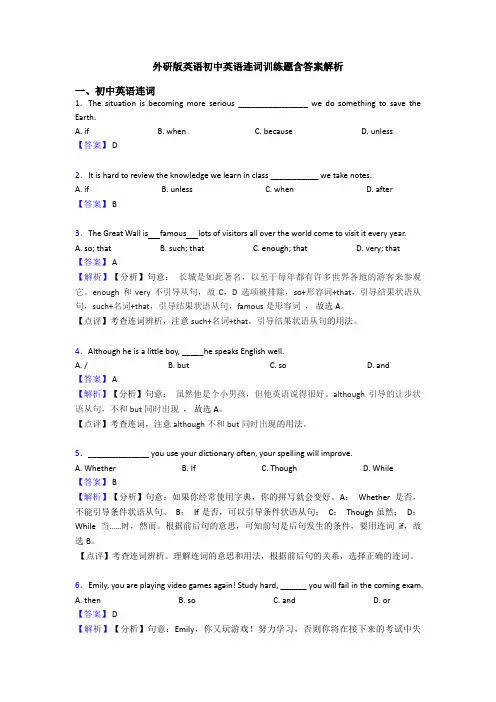
外研版英语初中英语连词训练题含答案解析一、初中英语连词1.The situation is becoming more serious ________________ we do something to save the Earth.A. ifB. whenC. becauseD. unless【答案】 D2.It is hard to review the knowledge we learn in class ___________ we take notes.A. ifB. unlessC. whenD. after【答案】 B3.The Great Wall is famous lots of visitors all over the world come to visit it every year. A. so; that B. such; that C. enough; that D. very; that【答案】 A【解析】【分析】句意:长城是如此著名,以至于每年都有许多世界各地的游客来参观它。
enough和very不引导从句,故C,D选项被排除,so+形容词+that,引导结果状语从句,such+名词+that,引导结果状语从句,famous是形容词,故选A。
【点评】考查连词辨析,注意such+名词+that,引导结果状语从句的用法。
4.Although he is a little boy, _____he speaks English well.A. /B. butC. soD. and【答案】 A【解析】【分析】句意:虽然他是个小男孩,但他英语说得很好。
although引导的让步状语从句,不和but同时出现,故选A。
【点评】考查连词,注意although不和but同时出现的用法。
5.______________ you use your dictionary often, your spelling will improve.A. WhetherB. IfC. ThoughD. While【答案】 B【解析】【分析】句意:如果你经常使用字典,你的拼写就会变好。
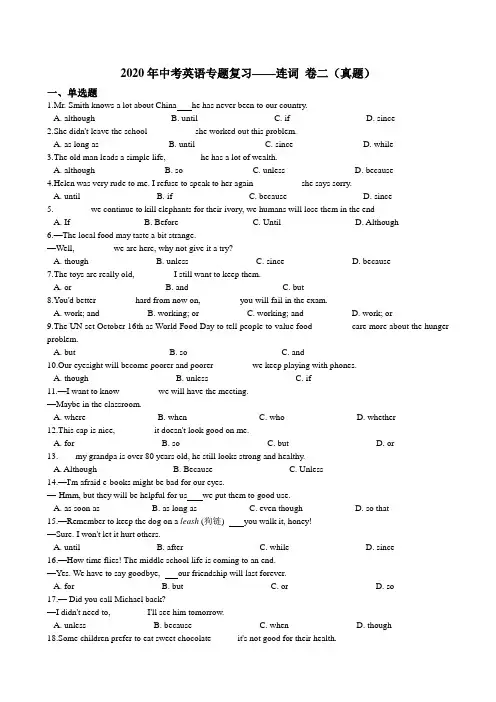
2020年中考英语专题复习——连词卷二(真题)一、单选题1.Mr. Smith knows a lot about China he has never been to our country.A. althoughB. untilC. ifD. since2.She didn't leave the school __________ she worked out this problem.A. as long asB. untilC. sinceD. while3.The old man leads a simple life, _______ he has a lot of wealth.A. althoughB. soC. unlessD. because4.Helen was very rude to me. I refuse to speak to her again __________ she says sorry.A. untilB. ifC. becauseD. since5.________ we continue to kill elephants for their ivory, we humans will lose them in the endA. IfB. BeforeC. UntilD. Although6.—The local food may taste a bit strange.—Well, ________ we are here, why not give it a try?A. thoughB. unlessC. sinceD. because7.The toys are really old, ________ I still want to keep them.A. orB. andC. but8.You'd better ________ hard from now on, ________ you will fail in the exam.A. work; andB. working; orC. working; andD. work; or9.The UN set October 16th as World Food Day to tell people to value food ________ care more about the hunger problem.A. butB. soC. and10.Our eyesight will become poorer and poorer ________ we keep playing with phones.A. thoughB. unlessC. if11.—I want to know ________ we will have the meeting.—Maybe in the classroom.A. whereB. whenC. whoD. whether12.This cap is nice, ________ it doesn't look good on me.A. forB. soC. butD. or13.____my grandpa is over 80 years old, he still looks strong and healthy.A. AlthoughB. BecauseC. Unless14.—I'm afraid e-books might be bad for our eyes.—-Hmm, but they will be helpful for us we put them to good use.A. as soon asB. as long asC. even thoughD. so that15.—Remember to keep the dog on a leash (狗链) you walk it, honey!—Sure. I won't let it hurt others.A. untilB. afterC. whileD. since16.—How time flies! The middle school life is coming to an end.—Yes. We have to say goodbye, our friendship will last forever.A. forB. butC. orD. so17.— Did you call Michael back?—I didn't need to, ________I'll see him tomorrow.A. unlessB. becauseC. whenD. though18.Some children prefer to eat sweet chocolate _____ it's not good for their health.19.—Let's go climbing Langshan Mountain this Saturday ______the weather is fine.—Good idea!A. thoughB. ifC. unless20.There was something wrong with my car, _____ I went to work by underground.A. forB. soC. orD. but21._____ the journey was tiring, Jeff thought it was worth both the time and the money.A. AsB. SinceC. UnlessD. Although22.Our business won't improve ____ we offer better service to our customers.A. becauseB. unlessC. afterD. since23.A better future is the goal of the Chinese people,_____ it's also the common interest of the world.A. soB. andC. orD. but24.—Can you come to the party this weekend?—Sorry, I'm going to take part in a competition, I must prepare for it.A. orB. butC. becauseD. and25.—Ling ling, you'll feel sleepy tomorrow _______ you go to bed early.—OK, Mom. I'll go to bed at once.A. ifB. unlessC. thoughD. because26.We didn't cut the cake______ Amy made a wish.A. becauseB. untilC. if27.Keep trying, ________ you might surprisingly find hidden abilities within you.A. butB. andC. or28.—Could you please tell me ________ I can buy some stamps?—Yes. There is a post office on Center Street.A. whyB. whereC. when29.—Lucy, you can't use the phone ________ we are far from the gas (天然气) station.—OK, I won't do that again.A. afterB. whenC. thoughD. until30.—I am worried about ________ I can enter a good high school or not.—Take it easy. Believe in yourself!A. thatB. whenC. whetherD. where31.Tom watched the World Cup ________ 11: 30 last night.A. whenB. unlessC. untilD. as soon as32.________ it's a public holiday today, some firefighters in our city are still on duty.A. AlthoughB. OnceC. If33.Before you ask someone for help, find out ________ he is the right person for your problem.A. sinceB. thatC. whetherD. unless34."Put on your coat, you will catch a cold!" This is what my mum often says to me.A. andB. butC. orD. so35.—What's the secret of success Dr. Know?— More time and effort, _________ you'll make it some day.A. yetB. orC. andD. but36.—What's the weather like in Kunming, Lucy?—It's hot cold. So Kunming is called "the Spring City".A. neither; norB. not only; but alsoC. either; orD. both; and37.I still keep taking exercise every day I am busy with so many subjects.38.Betty kept silent at first _______ soon she joined the other girls, chatting and laughing.A. soB. butC. orD. because39.Never put off ________ tomorrow what you can do today.A. untilB. beforeC. whenD. as40.I really want to have a pet dog, _______ my mother disagrees.A. butB. andC. orD. so答案解析部分一、单选题1.答案:A解析:句意:斯密史先生了解很多有关中国的事,尽管他从没有来过我们国家。
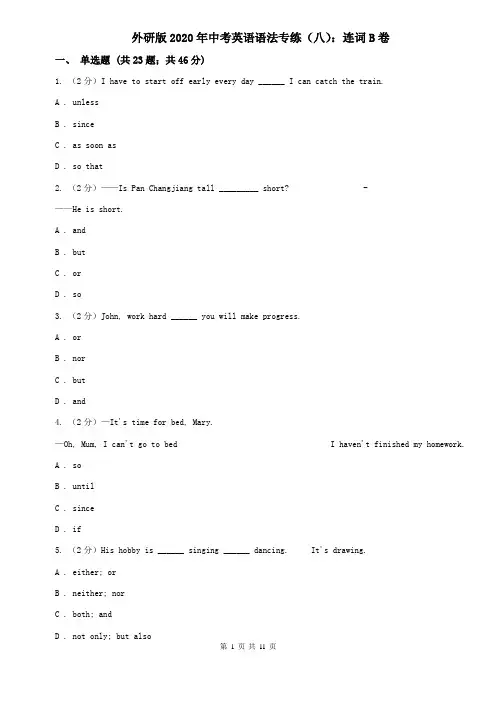
外研版2020年中考英语语法专练(八):连词B卷一、单选题 (共23题;共46分)1. (2分)I have to start off early every day ______ I can catch the train.A . unlessB . sinceC . as soon asD . so that2. (2分)——Is Pan Changjiang tall _________ short? -——He is short.A . andB . butC . orD . so3. (2分)John, work hard ______ you will make progress.A . orB . norC . butD . and4. (2分)—It's time for bed, Mary.—Oh, Mum, I can't go to bed I haven't finished my homework.A . soB . untilC . sinceD . if5. (2分)His hobby is ______ singing ______ dancing. It's drawing.A . either; orB . neither; norC . both; andD . not only; but also6. (2分)- What do you think of your Junior Middle School life?- I think it is colorful, ______ I am always busy.A . ifB . thoughC . whileD . until7. (2分)Jim is an American,he can speak Chinese very well.A . ifB . soC . butD . because8. (2分)—Do you think Jack will catch up with us?—I believe so. he loses himself in computer games.A . IfB . UnlessC . Or9. (2分)Gian Tara is studying Chinese history and culture now. They find them rich and amazing.A . Both; andB . Not only; but alsoC . Either; orD . Neither; nor10. (2分)To protect trees, we shouldn't use paper towels ______napkins.A . orB . andC . butD . with11. (2分)Does she like math or English?________. She is good at it.A . She likes math.B . Yes, she does.C . No, she doesn't.12. (2分)There was something wrong with my car, _____ I went to work by underground.A . forB . soC . orD . but13. (2分)Peter likes pop music, but his father his mother likes it.A . both; andB . not only; but alsoC . neither; norD . either; or14. (2分)I can't play with Alan, I have a lot of things to do.A . soB . becauseC . butD . and15. (2分)________ I got up late, ________ I didn't catch the bus.A . Because, /B . Because, soC . Since, soD . /, as16. (2分)—Shiyan is trying to build the civilized city(文明城市).—Yes, when we cross the street we must wait ________ the traffic lights turn green.A . untilB . as long asC . as soon asD . if17. (2分)——Would you like to come to my house for dinner tonight?——I'd love to , _____ I have lots of work to do .A . soB . orC . andD . but18. (2分)I don't understand the text, there are few new words.A . soB . becauseC . ifD . though19. (2分)Jim can play the drums, ____________ he can't play very well.A . andB . butC . orD . so20. (2分)_______ hard, and you will learn English much better.A . WorkB . To workC . WorkingD . Worked21. (2分)— Are you willing to buy something big like a house from online shops?— It sounds great ________ I won't do that.A . butB . unlessC . thoughD . since22. (2分)The environment will be much worse ______everyone has a sense of protecting it.A . unlessB . ifC . so that23. (2分)Bob, dinner is ready. Please wash your hands you eat.A . untilB . afterC . whileD . before二、句型转换 (共10题;共24分)24. (3分)At first, he didn't know what he could do in the new group.(改为简单句) At first, he didn't know ________ ________ do in the new group.25. (1分)句型转换。
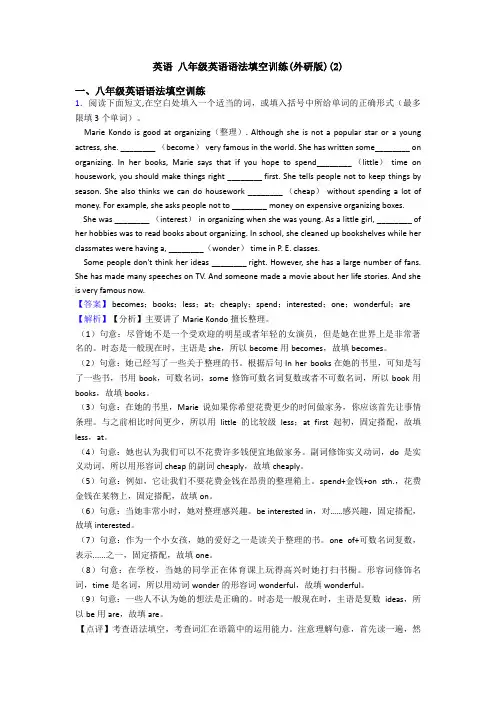
英语八年级英语语法填空训练(外研版)(2)一、八年级英语语法填空训练1.阅读下面短文,在空白处填入一个适当的词,或填入括号中所给单词的正确形式(最多限填3个单词)。
Marie Kondo is good at organizing(整理). Although she is not a popular star or a young actress, she. ________ (become) very famous in the world. She has written some________ on organizing. In her books, Marie says that if you hope to spend________ (little)time on housework, you should make things right ________ first. She tells people not to keep things by season. She also thinks we can do housework ________ (cheap)without spending a lot of money. For example, she asks people not to ________ money on expensive organizing boxes.She was ________ (interest) in organizing when she was young. As a little girl, ________ of her hobbies was to read books about organizing. In school, she cleaned up bookshelves while her classmates were having a, ________(wonder) time in P. E. classes.Some people don't think her ideas ________ right. However, she has a large number of fans. She has made many speeches on TV. And someone made a movie about her life stories. And she is very famous now.【答案】 becomes;books;less;at;cheaply;spend;interested;one;wonderful;are 【解析】【分析】主要讲了Marie Kondo擅长整理。
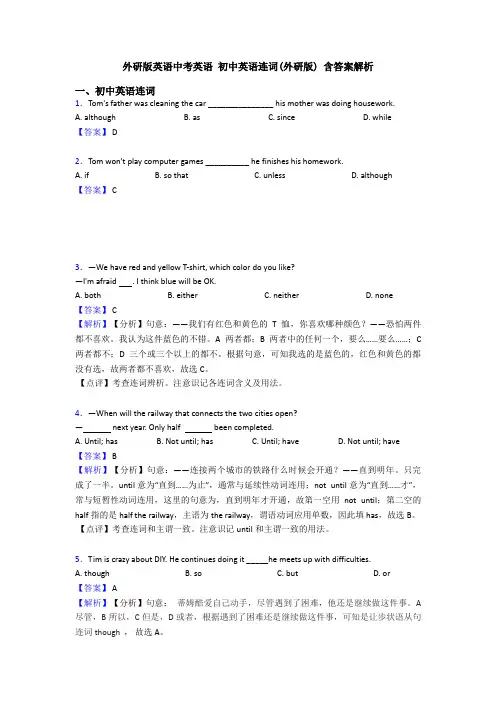
外研版英语中考英语初中英语连词(外研版) 含答案解析一、初中英语连词1.Tom's father was cleaning the car _______________ his mother was doing housework.A. althoughB. asC. sinceD. while【答案】 D2.Tom won't play computer games __________ he finishes his homework.A. ifB. so thatC. unlessD. although【答案】 C3.—We have red and yellow T-shirt, which color do you like?—I'm afraid . I think blue will be OK.A. bothB. eitherC. neitherD. none【答案】 C【解析】【分析】句意:——我们有红色和黄色的T恤,你喜欢哪种颜色?——恐怕两件都不喜欢。
我认为这件蓝色的不错。
A 两者都;B 两者中的任何一个,要么……要么……;C 两者都不;D 三个或三个以上的都不。
根据句意,可知我选的是蓝色的,红色和黄色的都没有选,故两者都不喜欢,故选C。
【点评】考查连词辨析。
注意识记各连词含义及用法。
4.—When will the railway that connects the two cities open?— next year. Only half been completed.A. Until; hasB. Not until; hasC. Until; haveD. Not until; have【答案】 B【解析】【分析】句意:——连接两个城市的铁路什么时候会开通?——直到明年。
只完成了一半。
until意为“直到……为止”,通常与延续性动词连用;not until意为“直到……才”,常与短暂性动词连用,这里的句意为,直到明年才开通,故第一空用not until;第二空的half指的是half the railway,主语为the railway,谓语动词应用单数,因此填has,故选B。
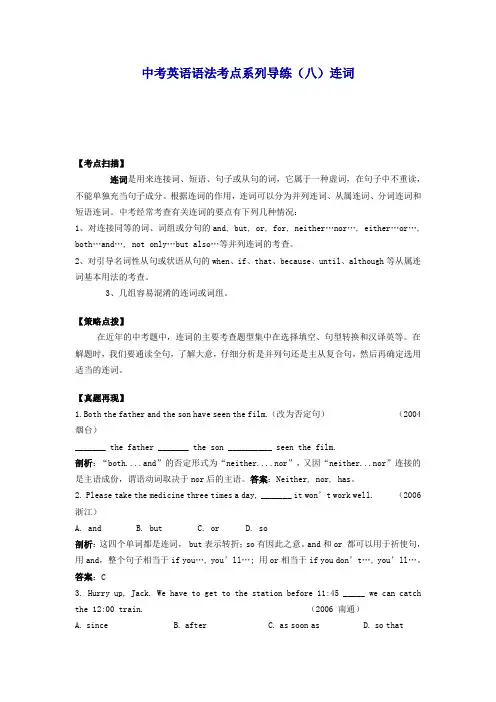
中考英语语法考点系列导练(八)连词【考点扫描】连词是用来连接词、短语、句子或从句的词,它属于一种虚词,在句子中不重读,不能单独充当句子成分。
根据连词的作用,连词可以分为并列连词、从属连词、分词连词和短语连词。
中考经常考查有关连词的要点有下列几种情况:1、对连接同等的词、词组或分句的and, but, or, for, neither…nor…, either…or…, both…and…, not only…but also…等并列连词的考查。
2、对引导名词性从句或状语从句的when、if、that、because、until、although等从属连词基本用法的考查。
3、几组容易混淆的连词或词组。
【策略点拨】在近年的中考题中,连词的主要考查题型集中在选择填空、句型转换和汉译英等。
在解题时,我们要通读全句,了解大意,仔细分析是并列句还是主从复合句,然后再确定选用适当的连词。
【真题再现】1.Both the father and the son have seen the film.(改为否定句)(2004烟台)_______ the father _______ the son __________ seen the film.剖析:“both....and”的否定形式为“neither....nor”,又因“neither...nor”连接的是主语成份,谓语动词取决于nor后的主语。
答案:Neither, nor, has。
2. Please take the medicine three times a day, _______ it won’t work well.(2006 浙江)A. andB. butC. orD. so剖析:这四个单词都是连词, but表示转折;so有因此之意。
and和or 都可以用于祈使句,用and,整个句子相当于if you…, you’ll…; 用or相当于if you don’t…, you’ll…。
外研版英语初中英语连词专题(含答案)含答案解析一、初中英语连词1.Some people won't realize the importance of their health ____ they lose it.A. becauseB. afterC. whenD. until【答案】 D2.Tom won't play computer games __________ he finishes his homework.A. ifB. so thatC. unlessD. although【答案】 C3.Tony has learned a lot about Chinese culture ______________ he came to China.A. beforeB. sinceC. untilD. when【答案】 B【解析】【分析】句意:自从来到中国托尼学到很多关于中国文化的东西。
before在……之前;和过去完成时连用;since自从,后跟表示过去的时间状语和现在完成时连用;until直到……才……;不和完成时连用,when当……时候;和过去完成时连用。
故选B。
【点评】连词辨析。
掌握每个连词的使用规则。
4.You'd better travel around Nanjing with a local tour guide ______________ you want to know more about its culture.A. unlessB. untilC. althoughD. if【答案】 D【解析】【分析】句意:如果你想了解南京的文化,最好带着当地的导游游览一下。
A:unless除非;B: until 直到……才(为止);C: although 尽管;D: if如果。
导游带领游览是了解南京的条件,因此要用从属连词if,故选D。
【点评】考查连词辨析。
外研版英语必备英语初中英语连词技巧全解及练习题(含答案) 含答案解析一、初中英语连词1.I don't like western food. I seldom eat it ______________ to McDonald's with my daughter.A. ifB. whenC. asD. unless【答案】 D2.Tom won't play computer games __________ he finishes his homework.A. ifB. so thatC. unlessD. although【答案】 C3.Tony has learned a lot about Chinese culture ______________ he came to China.A. beforeB. sinceC. untilD. when【答案】 B【解析】【分析】句意:自从来到中国托尼学到很多关于中国文化的东西。
before在……之前;和过去完成时连用;since自从,后跟表示过去的时间状语和现在完成时连用;until直到……才……;不和完成时连用,when当……时候;和过去完成时连用。
故选B。
【点评】连词辨析。
掌握每个连词的使用规则。
4.You'd better travel around Nanjing with a local tour guide ______________ you want to know more about its culture.A. unlessB. untilC. althoughD. if【答案】 D【解析】【分析】句意:如果你想了解南京的文化,最好带着当地的导游游览一下。
A:unless除非;B: until 直到……才(为止);C: although 尽管;D: if如果。
导游带领游览是了解南京的条件,因此要用从属连词if,故选D。
2020年中考英语连词专项练习(名师精选全国真题,值得下载练习)考点扫描连词分并列连词和从属连词两大类。
并列连词用来连接并列关系的词或句;从属连词用来连接主从关系的句子,如宾语从句、状语从句。
近几年中考英语试题在选择题和句型转换部分基本上各有1-2题考查并列连词或从属连词的用法。
考点剖析一、并列连词1.and“和”,“那么”常用结构:祈使句+逗号+and+一般将来时Think it over,and you’ ll work it out.可以改写成If you think it over,you ll work it out.2.or “或者”,“否则”常用结构:祈使句+逗号+or +一般将来时Hurry up, or you’ ll be late. 可以改写成If you don’t hurry up,you’ll be late.3.but “但是”, 不能和though同时出现。
4.so “所以”,不能和because同时出现。
5.“不仅…而且…”有以下三种表达方式:(1)both A and B,作主语时后跟动词复数。
(2)not only A but also B,作主语时动词单复数取决于B。
(3)A as well as B,作主语时动词单复数取决于A。
Both Tom and I are students.Not only Tom but also I am a studentTom as well as I is a student6. neither A nor B “既不…也不...”作主语时动词单复数取决于BNeither the teacher nor the students have been to Japan.7.e ither A or B “要么……要么……”You may either stay at home or go to the cinema.(作主语时动词单复数用法同6)二、从属连词1.that连接宾语从句,在从句中不作任何成分,无意义,可省略。
外研版英语中考英语《初中英语连词》单元测试题(含答案) 含答案解析一、初中英语连词1.British people and Australian people speak the same language, ______________ they have different customs and cultures.A. andB. butC. soD. for【答案】 B2.You like football ___________ she likes reading.A. WhenB. orC. becauseD. while【答案】 D3.In summer, food will go bad quickly we put it into a fridge.A. ifB. unlessC. as soon asD. when【答案】 B【解析】【分析】句意:在夏天,食物会很快的变质,除非我们把它放进冰箱里。
if 如果;unless除非;as soon as一……就……while当……的时候。
根据常识可知在夏天食物放在冰箱才不会马上变质,此处是unless引导的条件状语从句,故选B。
【点评】此题考查连词辨析。
弄清所给连词意思,然后根据上下文的联系确定所使用的连词。
4.Bill, stop smoking, you'll get better soon.A. butB. afterC. orD. and【答案】 D【解析】【分析】句意:比尔,不要抽烟,那么你很快好起来。
A.但是;B.在……之后;C.或者,否则;D.和。
该句是祈使句,且句子前后是并列顺承关系,因此用and,故答案选D。
【点评】考查连词辨析。
注意句子涉及到祈使句,and/or+陈述句的用法。
5.The Great Wall is famous lots of visitors all over the world come to visit it every year.A. so; thatB. such; thatC. enough; thatD. very; that【答案】 A【解析】【分析】句意:长城是如此著名,以至于每年都有许多世界各地的游客来参观它。
外研版英语初中英语连词专项练习含答案解析一、初中英语连词1.My father was preparing for his speech ______________ my mother was doing some washing last night.A. ifB. unlessC. whileD. until【答案】 C2.___________ you know the answer, please ___________ your hand.A. If; raiseB. If; riseC. Unless; raiseD. Unless; rise【答案】 A3.The little boy was______ excited _____ say a word when he knew the result of the final exam.A. too; toB. so; thatC. so; asD. such; that【答案】 A【解析】【分析】句意:当这个小男孩知道期末考试的结果时,他激动得说不出话来。
A 太而……不能,不引导从句,B如此……以至于,修饰形容词,引导结果状语从句,C和……一样,不引导从句,D如此……以至于,修饰名词,引导结果状语从句,excited是形容词,此处是结果状语从句,故选A。
【点评】考查连词辨析,注意so...that引导结果状语从句的用法。
4.— Do you know ____________Grandma is going to visit us?—Next Saturday. She told me on the phone.A. whereB. whyC. whenD. whether【答案】 C【解析】【分析】句意:——你知道奶奶什么时候来看望我们吗?——下周六。
她在电话告诉我们的。
where 哪里;why 为什么;when 何时;whether是否. 根据答语next Saturday,可知问的是时间,用when提问,故选C。
外研版英语初中英语连词试题和答案含答案解析一、初中英语连词1.I got up at six this morning _____________ I could catch the early bus to Nanjing.A. soB. thatC. in order toD. so that【答案】 D2.My mother has little interest in football ___________ she didn't watch the live match on TV yesterday evening.A. soB. ifC. thoughD. when【答案】 A3.Bill, stop smoking, you'll get better soon.A. butB. afterC. orD. and【答案】 D【解析】【分析】句意:比尔,不要抽烟,那么你很快好起来。
A.但是;B.在……之后;C.或者,否则;D.和。
该句是祈使句,且句子前后是并列顺承关系,因此用and,故答案选D。
【点评】考查连词辨析。
注意句子涉及到祈使句,and/or+陈述句的用法。
4.Tony has learned a lot about Chinese culture ______________ he came to China.A. beforeB. sinceC. untilD. when【答案】 B【解析】【分析】句意:自从来到中国托尼学到很多关于中国文化的东西。
before在……之前;和过去完成时连用;since自从,后跟表示过去的时间状语和现在完成时连用;until直到……才……;不和完成时连用,when当……时候;和过去完成时连用。
故选B。
【点评】连词辨析。
掌握每个连词的使用规则。
5.You'd better travel around Nanjing with a local tour guide ______________ you want to know more about its culture.A. unlessB. untilC. althoughD. if【答案】 D【解析】【分析】句意:如果你想了解南京的文化,最好带着当地的导游游览一下。
外研版2020年中考英语语法专练(八):连词(II )卷一、单选题 (共23题;共46分)1. (2分)Peter likes reading a newspaper ____ he is having breakfast.A . whileB . becauseC . thoughD . until2. (2分)——Is Pan Changjiang tall _________ short? -——He is short.A . andB . butC . orD . so3. (2分)Remember to return the book to the school library in time, _______ you will be fined (罚款).A . orB . andC . butD . then4. (2分)—What do you think of your junior middle school life?—I think it is colourful, ______ I am always busy.A . ifB . thoughC . whileD . until5. (2分)-- What do you like doing after class?-- I like not only reading painting.A . andB . but alsoC . orD . for6. (2分)_________Kate _________Ben is late.They always go to school on time.A . Either,orB . Neither,norC . Both,and7. (2分)Running Man is _____ funny ______many kids enjoy seeing it.A . so; thatB . such; thatC . too; toD . as; as8. (2分)______many people like to eat junk food, ______they should really eat more fruit and vegetables.A . Although; /B . Although; butC . But; althoughD . /; /9. (2分)Anna her brother like listening to soft music.A . Both; andB . Neither; norC . Either; orD . Not only; but also10. (2分)— Do you want to eat out, ________ would you rather stay at home?— It's up to you.A . butB . andC . orD . so11. (2分)— Is he watching TV or doing his homework?A . Yes, he is.B . No, he isn't.C . He's watching TV.D . He doesn't like TV.12. (2分)Taxi apps(打车软件) can help us travel around more easily. ____________ more and more people like using them.A . OrB . SoC . AndD . But13. (2分)Rules are helpful to us, we have to follow them.A . soB . butC . orD . because14. (2分)________ this method doesn't work, let's try another.A . SinceB . AlthoughC . But15. (2分)I would like to play with you, _______ I have to do my homework first.A . orB . soC . andD . but16. (2分)He doesn't want to learn Japanese _______ he doesn't like it.A . soB . andC . or17. (2分)_________ we didn't win the basketball game, we were satisfied with our hard work.A . IfB . ThoughC . SinceD . Because18. (2分)______ it was the rush hour, Eric arrived on time.A . AlthoughB . BecauseC . WhileD . Unless19. (2分)Jack usually goes to school by bike, ________ today he walked to school.A . andB . butC . orD . so20. (2分)Hurry up, ________you will miss the early bus.A . orB . andC . ifD . unless21. (2分)_____ Tom _______ Mary speaks Chinese well, so they can communicate with these Chinese students very well.A . Neither, norB . Both ,andC . Not only, but alsoD . Either ,or22. (2分)It's a serious problem. We can't make a decision Mr. Black comes back.A . whileC . untilD . so23. (2分)Our eyesight will become poorer and poorer ________ we keep playing with phones.A . thoughB . unlessC . if二、句型转换 (共10题;共24分)24. (3分)The computer is about 35 centimeters wide. (对画线部分提问)________ ________is the computer?25. (1分)按照要求完成句子改写。
(1)My uncle does some housework after he comes back from work. (改为否定句)My uncle ________ ________ ________ housework after he comes back from work.(2)My cousin hopes to be a member of the school football club. (改为同义句)My cousin hopes to ________ ________ the school football club.(3)I am never late for the meeting. (对划线部分提问)________ ________ ________ ________ late for the meeting?(4)Amy's mother comes to the park on foot twice a week. (对划线部分提问)________ ________ Amy's mother ________ to the park twice a week?26. (2分)Jack left London when he was eleven. (改为同义句)Jack left London________ ________ ________ ________eleven.27. (2分)(1)He speaks French. ( 对划线部分提问 )________ ________ ________ he ________ ?(2)Where is your friend from? (同义句)Where ________ your friend ________ ________ ?(3)There are some boys in the room.(改一般疑问句并回答)________ there________ boys in the room?Yes, ________ are ________ .(4)My brother loves dolphins because they are interesting.(对划线部分提问)________ ________ your brother ________ dolphins ?(5)Can you tell me how to get to the bank? (同义句)Please________ me ________ ________ ________ the bank.28. (2分)The book is interesting. There are many stories in it. (保持句意基本不变)It is ________ interesting book ________ many stories in it.29. (2分)She likes chatting with her friends. (对划线部分提问)________ ________ she like chatting with?30. (4分)It's Saturday today. (对画线部分提问)________ ________ is it today?31. (5分)My T-shirt is 30 dollars. (对画线部分提问)________ ________is your T-shirt?32. (2分)That is Anna's hat. (改为复数形式)33. (1分)My sister likes eating. She doesn't like cooking.(合并为一句)My sister likes eating, ________she doesn't like cooking.三、语法填空 (共7题;共12分)34. (2分)Jim does well________math. (填介词)35. (1分)—Why do you like pandas?—________they are cute.36. (1分)It will be much easier for people in Suqian to go out if the High-speed Rail________ (build).37. (5分)Look! Mary ________ (play) tennis with her friend.38. (1分)I wanted to phone you, ________ I didn't have your telephone number. (填连词)39. (1分)Shall we go now ________ shall we go this afternoon? (填连词)40. (1分)This programme can help me learn more about the world, ________ I like it. (填连词)参考答案一、单选题 (共23题;共46分)1-1、2-1、3-1、4-1、5-1、6-1、7-1、8-1、9-1、10-1、11-1、12-1、13-1、14-1、15-1、16-1、17-1、18-1、19-1、20-1、21-1、22-1、23-1、二、句型转换 (共10题;共24分) 24-1、25-1、25-2、25-3、25-4、26-1、27-1、27-2、27-3、27-4、27-5、28-1、29-1、答案:略30-1、31-1、32-1、33-1、三、语法填空 (共7题;共12分) 34-1、35-1、36-1、37-1、38-1、39-1、40-1、。